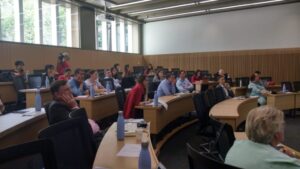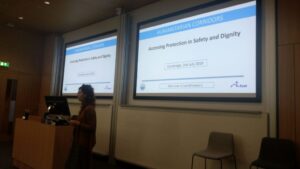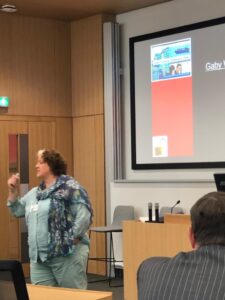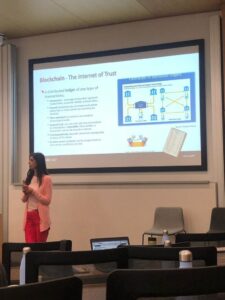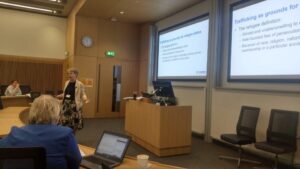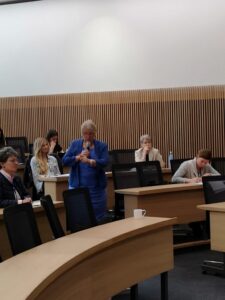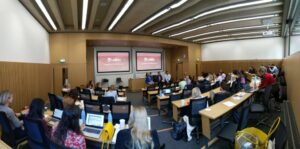2019 Summer Symposium
Held at the Judge Business School, University of Cambridge in kind collaboration with the Cambridge Centre for Social Innovation.
The Several Rs of Trafficking: its Risks and Rewards
Re-framing, Refugees, Rights, Religion, Race, Reporting, Recording, Revenues, Routes, Reduction, Recovery, Removal, Remedy, Relationships, and our Responsibilities.
This was the fourth in the series of five symposia building on the #2020 vision set out at the first CCARHT Summer Symposium in 2015.
This year we welcomed scholars, professors, counter trafficking practitioners, policy makers, lawyers, business leaders, task force developers, and health professionals all passionate to play their part in dismantling the systems that sustain the offence of human trafficking, modern slavery and chattelage in our time.
The Several Rs of Trafficking walked participants through the range of risks and rewards which drive forward human trafficking, ensnaring its victims, incentivising its practitioners, arbitraging differences between economic and social systems, and inexorably building customers, clients and ‘destructive, anti-social, economic resource’ across the globe.
THEMATIC SCHEDULE
Day One
The Risks and Rewards of Human Trafficking
an update on the current state of the economics, business models and prosecution rates in the UK, and affiliated source countries.
Presentation of arguments and fresh research on how to drive down the Rewards and heighten the risks of Trafficking for those who partake in this most vile and exploitative trade.
Chaired by Professor Simon Stockley looking at the contribution of economic modelling and the shaping of socially ‘deviant’ entrepreneurship, alongside heightening the effectiveness of pursuit and prosecution, with our invited experts.
Day Two
Routes, Restrictions, Race and Rights
The law of the sea, U.S. border matters, global movements, the rise of Nation State protectionism, safe routes, the right to migrate in safety.
Routes. Thousands of those in migration die at borders seeking passage to the next stage of their journey. Thousands more are beaten, raped, tortured, half starved, intimidated, placed at enormous risk put in containers, incarcerated in lorries, vans, hidden in bunkers, half starved, dehydrated on their journeys. We shall be looking at the routes which are being deployed by traffickers and the intersectionality with smuggling and regular transport provision. What does law enforcement know about these routes, how is technology being deployed in tracing the illicit movement of people, and what can be done to mitigate the horrors of these dangerous and desperate journeys?
With the ongoing humanitarian disaster proceeding in Libya, and open state hostility faced by NGOs seeking to operate safety ships in the Mediterranean, we shall examine the Rights of the law of the Sea, and how this entitles the work which NGOs are seeking to undertake, as well as explore the ‘push – pull’ factors which some European politicians are arguing supports the closure of ports from receiving ‘mercy’ missions.
When does smuggling move into Trafficking criminality, when does the shift in descriptor become a matter of political maneuvring and the lexicon of nationalist protectionism? Are new routes emerging and what drives these? Who is doing what about the routes, and what do their trajectories tell us about the contemporary radical inequalities of our Global ‘village’.
Chaired by Dr Carrie Pemberton Ford
Film Evening with discussion. 8.00 – 10.00pm (included in week ticket)
Day Three
Refugees, Registration, Reporting and Returns
With the numbers of those fleeing conflict and civil war, living unsettled lives in Internally displaced camps, and refugee camps outside their home countries, continuing to dominate segments of our global terrain, and with the average number of years for people staying in displacement outside of their ‘homelands’ rising to an estimated 17 years – it is clear that Refugees are a potent recruiting ground for Trafficking ‘messiahs’. We shall be exploring with UN based humanitarian aid workers, policy makers and EU legislators on what needs to change to bring this area of heightened risk and vulnerability under control.
With missing persons internationally frequently failing to have robust reporting systems to support their safety, and many countries struggling with how to report trafficking incidents, and risks successfully, we shall be looking at some of the best practice in reporting systems, and looking at the next generation of how this reporting can exploit further the power of social media and tech.
The hope and the fear, the risks and the opportunities of Return. Who decides, what needs to be in place for human rights to be respected and safeguarded, and what do the patterns of the last two decades tell us about safe Return and its requirements, and the right to be able to take residence in the country of exploitation for those who have been trafficked. Our lawyers and safe house specialists engage.
Chaired by Markella Papadoulli
Day Four
Recruitment, Recovery, Remedy and Religion
Lover boy Recruitment, Eastern Europe in focus, the deployment of ancient rituals of ‘contract’ West Africa, Cyber recruitment into on – line porn – global, exploitation of vulnerabilities.
The long term nature of psychological and social recovery.
From the registering of ‘missing persons’ to ensuring that minors are located in migratory movements, and that those in IDPs and Refugee camps are registered and brought meaningful citizenship.
The deployment of a range of resources to counter trafficking, and the role Religion now plays in both trafficking’s manifestation and interdiction.
Recovery Recovering from the trauma of Human Trafficking is a long journey, requiring the participation of a battery of professionals: lawyers, psychotherapists, health specialists, business support, religious mediators, embassy personnel, and the protective services. There have been a number of tentative reports looking at the costs of trafficking recovery, which we shall explore as part of the day. As countries are encouraged to develop more efficient referral mechanisms, we shall explore the cost impact to States as the requirement for reporting, and delivering quality services of support to full recovery of those who have endured trafficking in their territories is absorbed. What are the minimum standards for providing ‘support’ and ‘safe housing’ for those referred to Governments as having been trafficked, and how are these standards to be quality assured, and scaled across countries who are signatories to the Palermo Convention, or Council of Europe’s Action against Trafficking in Human Beings?
Whose responsibility is it to shoulder the lion’s share of recovery costs? the country of source, the country of destination, who pays and for what duration? We shall be looking at the costs accruing to Health Care provision, Psychological interventions, Legal Aid, housing, social support, retraining, and supporting into work. Where trafficked survivors are returned to countries of source, we shall look at some of the arguments being deployed around sufficiency of protection, and the potential economics which is driving returns.
The outcomes of the two year European Union funded project, the Psychological Health Impacts of Trafficking in Human Beings (PHIT) undertaken by the Universities of Barcelona and Tubigen will constitute our afternoon’s study session on some of the new learning emerging around diagnosing and managing complex Post Traumatic Stress Disorder, empowering survivors and eliciting their voice through narrational interviewing; chaotic recall and ‘first interview’ challenges for survivors, police and home office officials; validating survivors trafficking experience outside of the criminal processes of enforcement – ‘remediation’ and the Dutch experiment.
Religion – the ‘opiate’ of the people – or the pro-biotic in the international body? We shall explore the deployment of trafficking by Daesh, the case studies of facilitation through diaspora connections permeated by traffickers and the creed of ‘a better life’, the role of ‘raising community awareness’ pioneered in Religious communities and congregations across denominations, safe housing initiatives, as well as the potential organised Religion of all religious creeds, could play in community proofing their ‘faithful’ from the inhumane tactics and false promises of trafficking recruitment, and the depravity of consumption through chattelage. We shall be looking at case studies from the Waldensian church in Italy, the Cherubim and Seraphim in Nigeria, the Romanian Orthodox Church, the Religious Congregations working against Trafficking in Europe, the first decade of ecumenical response to Trafficking in the UK, and the challenges faced by secular governments as well as the opportunities in deploying Mosques, Churches, Synagogues and Temples in work against Human Chattelage and Trafficking.
Evening Arts Event – with panel discussion more information available for those purchasing tickets . The Infusion Physical Theatre company present a bold fusion of contemporary dance and physical theatre outlining the deception and coercive control of Lover Boy recruitment for those pimped into prostitution and the ongoing challenge of addressing demand. Limited tickets available for those not attending the symposium.
Chaired by Revd Dr Carrie Pemberton Ford
Day Five
Removal (of Organs), Rape, (social) reproduction, Relationships, RESPONSIBILITY and Reparation
Part one Removal of Organs. A precedent setting case brought against an Organ Trafficker in Israel is our point of departure for looking at the way in which Organs have been incorporated into the portfolio of concern around Human Trafficking. With a low visible enforcement footprint, this day will be lifting the lid to examine what is currently known about the prevalence of Organ Trafficking. We shall be calling on those who have been working on researching the phenomenon and developing awareness of how this crime has been surfacing in various countries, where the strict regulation of organs for transplantation has been subverted by unscrupulous surgeons and recruiters. We shall examine how legislation, professional formation, and technology can play their part to disrupt perpetrators who treat a person’s body as an entrepreneurial opportunity, a depository of replaceable machinery parts whose sole purpose is to bear the organs that may be harvested and sold. Does opting out for organ donation make a difference? What lessons has Spain to teach the EU on its twenty five year experience in opt out?
Further challenges will be raised for how body parts claimed to be deployed in certain Traditional Religious practices in parts of Africa, and crushed in the creation of Traditional Medicine marketed in Asia can be investigated and the extent of the practice appropriately assessed. What is the role of culture, technology, religion and legislation in suppressing such activity and closing down its transmission to the next generation.
The day will be supported by expert speakers, film, and key papers, to enable an informed enquiry as to how to raise the highly emotive, and where it is practiced exceeding dangerous subject of organ removals, in a proportionate and measured way. We shall be welcoming speakers from Romania, Nigeria, the Republic of South Africa, Germany and Spain to enlighten our discussions.
Co- Chaired by Professor Silvia Tabusca and Grahame Maxwell
Across the week – Thematic Revenues and Remittances Throughout the week we shall be looking at the Revenues which are being generated by Human Trafficking enterprises, the perverse entrepreneurial talent and organisational structures which underpin businesses developing their reach, expansion and control of this market in human misery.
Rights and Responsibilities folds in as another cross cutting thematic interest which will weave across the specific topics set for each day. We shall be asking ourselves the questions embedded in the UN Declaration of Human Rights (1948) which underpins all international actions responding to the challenge of Human Trafficking as defined in the Palermo Protocol 2000.
Submit your abstract for consideration.
Any who believes their research is congruent with our schedule or aligned to the Several Rs of Trafficking, submit a 600 word synopsis, CV, and indicative publications aligned to the research are welcome to send us for consideration for publishing in our associated papers which will be brought together after the Symposium July 30th 2019.
Publication of those already accepted for presentation will be assisted into a peer-reviewed combined print and on-line journal curated by CCARHT.
Email all abstracts to symposium@ccarht.org. Abstract for consideration in the Subject line. Thank you and look forward to receiving your contributions to the final publication which is programmed for December 2019.
List of 2019 Speakers:
- Ahmed Uddin
- Amandine Bressand
- Alessandra Sciurba
- Alex Christopoulos
- Alison Wilson
- Andrei Ciurcanu
- Anthony Dunkerley
- Bahija Jamal
- Belinda Bell
- Benjamin Thomas Greer
- Bernie Gravett
- Brad Blitz
- Carole Murphy
- Carole Stolz
- Caroline Haughey
- Carrie Pemberton Ford
- David B. Grant
- David Westlake
- Dietmar Roller
- Elif Cetin
- Esohe Aghatise
- Esperanza Jorge Barbuzano
- Fausto Melluso
- Fulvio Vassallo Paleologo
- Gerald Tatzgern
- Grahame Maxwell
- Halleh Seddighzadeh
- Ingeborg Kraus
- Inmaculada Antolinez
- Isabel Apawo Phiri
- Jagbir Jhutti-Johal
- Jamal Bahija
- Jan Samuel Willoch
- Jill Langhus Griffin
- Julie Okah-Donli
- Kalyani Gopal
- Kathryn E. Van Doore
- Kerry Gibson
- Kieran Guilbert
- Klaus Henri Vanhoutte
- Luis C. de Baca
- Loraine Gelsthorpe
- Mandy Sanghera
- Mark Blick
- Mark Burns Williamson
- Mark Capaldi
- Markella Papadouli
- Mina Yumin Chiang
- Nadine Daniel
- Neil Stott
- Neena Samota
- Nicola Padfield
- Patricia Hynes
- Patrick Burland
- Peter Rook
- Philippa Kempson
- PM Nair
- Rachel Harper
- Rainer Franosch
- Rossella Pagliuchi-Lor
- Riel Karmy-Jones
- Rosalind Copisarow
- Sabin Muzaffar
- Samantha Iwowo
- Sara Silvestri
- Saradamoyee Chatterjee
- Sarah Steele
- Ser-Huang Poon
- Silvia Tabusca
- Simon Stockley
- Soulla Louca
- Tania Garcia Sedano
- Teo Keipi
- Teresa Rodriguez
- Valeria Ragni
- Victoria Baines
- Vladimir Ubeivolc
Photos CCARHT Summer Symposium 2019
